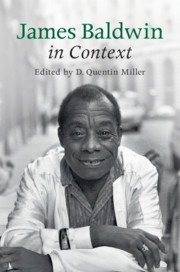Book contents
- James Baldwin in Context
- James Baldwin in Context
- Copyright page
- Contents
- Contributors
- Introduction: James Baldwin in Context
- Part 1 Life and Afterlife
- Chapter 1 Harlem During and After the Renaissance
- Chapter 2 American Writers in Paris
- Chapter 3 Greenwich Village and Emerging Bohemianism
- Chapter 4 1963: Baldwin’s Annus Mirabilis
- Chapter 5 East Meets West: Baldwin in Istanbul in the 1960s
- Chapter 6 Baldwin as Teacher
- Chapter 7 A Long Way from Home: Baldwin in Provence
- Chapter 8 Decline of Reputation in the 1980s
- Chapter 9 The Critical Renaissance: 1999–Present
- Chapter 10 Biographies
- Chapter 11 The Matter of Black Lives: Baldwin Today
- Part 2 Social and Cultural Contexts
- Part 3 Literary Contexts
- Index
Chapter 9 - The Critical Renaissance: 1999–Present
from Part 1 - Life and Afterlife
Published online by Cambridge University Press: 12 July 2019
- James Baldwin in Context
- James Baldwin in Context
- Copyright page
- Contents
- Contributors
- Introduction: James Baldwin in Context
- Part 1 Life and Afterlife
- Chapter 1 Harlem During and After the Renaissance
- Chapter 2 American Writers in Paris
- Chapter 3 Greenwich Village and Emerging Bohemianism
- Chapter 4 1963: Baldwin’s Annus Mirabilis
- Chapter 5 East Meets West: Baldwin in Istanbul in the 1960s
- Chapter 6 Baldwin as Teacher
- Chapter 7 A Long Way from Home: Baldwin in Provence
- Chapter 8 Decline of Reputation in the 1980s
- Chapter 9 The Critical Renaissance: 1999–Present
- Chapter 10 Biographies
- Chapter 11 The Matter of Black Lives: Baldwin Today
- Part 2 Social and Cultural Contexts
- Part 3 Literary Contexts
- Index
Summary
The critical renaissance in Baldwin studies since 1999 was spearheaded by Dwight McBride’s collection, James Baldwin Now, which challenged the rigid categorization of Baldwin’s work and identity as fitting the either/or categories of black, gay, American, essayist, novelist. McBride’s collection situated Baldwin as all of those things at once, and highlighted why reading Baldwin was important to understanding our contemporary questions. In many ways, the criticism has caught up with Baldwin. The burgeoning fields of black studies, queer studies, ethnic studies, and transnational American studies in the last three decades have provided new modes of reading literature and the world beyond traditional disciplinary traditions. In the twenty-first century there is perhaps no more compelling figure than Baldwin, a writer who refused to accept identifying labels; who wrote across continents, genres, and traditions; and who defied normative identifications of nationality, gender, race, and sexuality. This essay relies on two key bibliographic essays: Lynn Orilla Scott’s “Trends in James Baldwin Criticism” in Volume 2 of James Baldwin Review and D. Quentin Miller’s “Trends in James Baldwin Criticism” in Volume 3. In addition to the trends Scott identifies in emerging scholarship – attention to Baldwin’s lesser-known works after the 1960s, his Turkish years, and greater historical and legal context to examine his relationship with the civil rights movement and black nationalism – Miller identifies several other major trends that have evolved since 2010, which are “a consideration of Baldwin in the contexts of film, drama, and music; understandings of Baldwin globally; Baldwin’s criticism of institutions; and analyses of Baldwin’s work in conversation with other authors.” I will highlight several other aspects that have been especially attended to since 2013: Baldwin’s work in relation to anticipating and helping craft theories in queer studies, further establishing the international and transnational contexts of black studies, and the excavation and analysis of archival material (FBI files, personal papers and letters, and ephemera from domestic life) previously unpublished.
- Type
- Chapter
- Information
- James Baldwin in Context , pp. 90 - 104Publisher: Cambridge University PressPrint publication year: 2019

